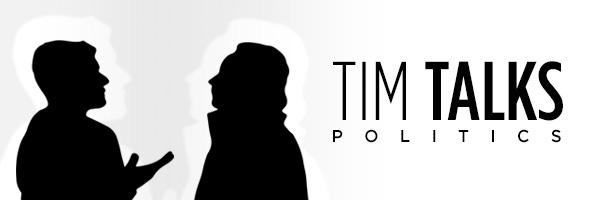TimTalksPolitics - The Weekly Brief

The Weekly Brief - January 12, 2018
What a fascinating week in the world we just had! One of the reasons I love studying international relations and world politics is that I'm reminded to look beyond the American borders. In a week where the American news cycle was dominated by Fire and Fury and the possibility (not actuality) of a future President Winfrey, international news organizations and think tanks were reporting on some significant stories.
Cooldowns in Korea and Iran
To everyone’s collective relief, North and South Korea achieved something of a diplomatic breakthrough just by sitting down and talking. The result was an agreement to welcome a North Korean team to next month’s Olympic games. It’s a small gain but could give impetus to renewed diplomatic efforts that kick off next week with the meeting of the Vancouver Group. Stay tuned.
It was a tumultuous week in Iran with mass protests in multiple cities calling for renewed government attention to Iranians’ economic needs. Many in America, of both conservative and liberal persuasions, were quick to hail the protests. However, the Iranian regime is well structured to absorb such unrest and the regime’s leaders move quickly to address concerns, at least rhetorically.
Turkey Lays an Egg in France, Looks for a New Roost
Last week, I shared one link about a developing tiff between Egypt and Turkey over developing a Sudanese port on the Red Sea. Well, turns out that tiff has some regional and geopolitical implications. First, the conflict seems to be growing out of Egyptian-Sudanese conflicts over border and water rights, which suggests Turkey and Sudan have common cause in undercutting Egyptian power.
However, Turkey’s arrival in the Red Sea area is not just troubling Egypt, but Saudi Arabia as well, which creates a geopolitical odd couple given a history of Egyptian and Saudi competition and tension in the Red Sea area.
A question that’s got me thinking: Why would Turkey knowingly piss off two of its most powerful regional competitors? It could be due to Turkish President Erdogan’s rough week in Paris that reportedly had French President Macron slamming the door on any future EU connection with Turkey. So, no dice with Europe, growing relations with Russia, why not try your luck in other areas?
Turkey, however, may not be hearing the last of Macron and a reenergized EU. No sooner had he snubbed Erdogan, Macron was in China to promote European engagement with China's New Silk Road. As the land bridge between Central Asia and Europe, Turkey stands to be a key player in China’s massive development project making future EU-Turkey relations something to watch closely.
While We’re on the Subject of China...
The New Silk Road represents China’s claim to economic superpower status and is already reshaping the politics of Central Asia. However, Elizabeth Economy (yes, that’s her last name) at the Council on Foreign Relations notes that China’s strong moves do not indicate the country is ready for global leadership despite what conventional wisdom claims.
American Economy Looking Up?
The real rub is that, according to Economy, America is not in a good position for global leadership either. She may be meaning political leadership because this last week saw some positive data points for the American economy.
Besides the continuing roaring growth of the stock market, the unemployment rate for African-Americans hit an all-time low and some economic observers see some wage gains on the horizon for American workers.
That’s not to say all is hunky dory. The American Enterprise Institute, in a new report, sheds light on the inefficiency and abuse of the farm subsidies program that leaves small farms in the cold while benefiting larger operations. Somehow, I don’t think that’s what FDR had in mind.
The Gossip Column News Cycle
You didn’t really think I would forget to mention the celebrity drama, did you? Stay with me, there’s a point here.
Social media and mass media seemed to lose its collective mind with the one-two punch of Michael Wolff’s expose-ish book Fire and Fury and Oprah’s razzle-dazzle speech at the Golden Globes. However, critics were quick to point out that Wolff’s book added little new information to what we already knew about Trump and in fact harmed the “Never Trump” argument with its analytical shallowness. The idea of President Winfrey was also noted as saying more about the Democratic Party than Oprah’s intention (Politico does a deep dive on this Democratic divide), and Robert Tracinski at The Federalist noted a sizable blind spot in Oprah’s image that would make her less than an ideal candidate.
(This isn’t to say that politics and pop culture don’t or shouldn’t mix. In one of the more brilliant political-pop culture mashups of this young year, The Office-isms has created a delightful set of photos of Donald Trump…. overlaid with Michael Scott quotes.)
However, the media response to the sequence of Fire and Fury and Winfrey’s speech says more about our media culture than the American public.
New research out of Stanford University suggests that the American public is not nearly as polarized as media narratives suggest. Pew Research published a poll of global opinions on journalism and found that audiences are aware of and desire less bias in news reportage. Unfortunately, the same audiences are consuming more news online where they get sledgehammered with polarizing headlines and content. So what to do? Stratfor recommends that we learn to care about clarity of language in journalism.
That’s all for me this week. If you’d like to read more on Tim Talks Politics, click on the button below to read the latest on the TTP blog.
And if you know someone who may enjoy reading this little newsletter, feel free to share and/or forward!


